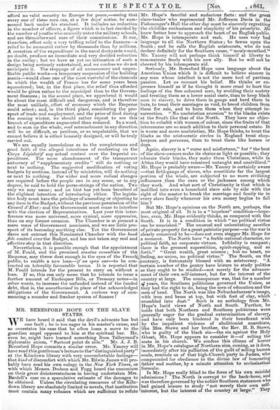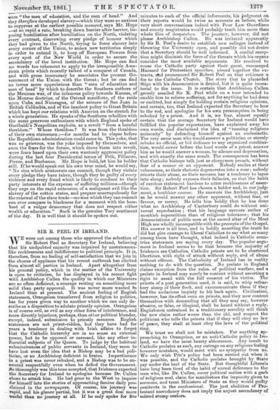MR. BERESFORD HOPE ON THE SLAVE STATES.
WE have heard it said that the devil's advocate has but one fault ; he is too eager in his master's cause, and so overstates his case that he often loses a move to the guardian angel opposed to him at the spiritual bar. He, even he, might have learned something from Talleyrand's diplomatic axiom, " Surtout point de zele." Mr. A. J. B. Beresford Hope commits a similar error. Mr. Yancey will have read this gentleman's lecture to the "distinguished party" at the Kilndown library with very uncomfortable feelings— that kind of discomfort with which Mr. Edwin James will pro- bably have read his own eulogy in the New York Times, or with which Messrs. Dodson and Fogg heard the encomium on their great disinterestedness in having undertaken Mrs. Bardell's case on a speculative estimate of the damages to be obtained. Unless the circulating resources of the Kiln- down library are absolutely limited to novels, that institution must contain many volumes which are anfficient to refute Mr. Hope's fanciful and audacious facts : and the great slave-trader who represented Mr. Jefferson Davie in the Fishmonger's Hall the other day must be sincerely regretting the childlike enthusiasm and simplicity of his proselyte. He knew better how to approach the heart of an English public. Mr. Hope is intemperate and rash. He uses very bad language to all the Northern States ; he fawns upon the South ; and he calls the English aristocrats, who do not declare definitely for the Southern cause, "mealy-mouthed." Mr. Yancey will not perhaps think himself at liberty to remonstrate freely with his new ally. But he will not be cheered by his intemperate aid. Seriously, Mr. Beresford Hope uses language about the American Union which it is difficult to believe sincere in any man whose intellect is not the mere tool of partisan passion. Let us recount his belief. He thinks or ex- presses himself as if he thought it more cruel to hurt the feelings of the free coloured men, by avoiding their society and treating them as a lower social caste, than to keep black men in slavery, to drive them in gauge and herd them in huts, to treat their marriages as void, to breed children from them for sale, and to burn them when they attempt in- surrection. " No unchristian aversion" to the blacks exists at the South like that of the North. They have no objec- tion to cohabit with women of colour, since the fruits bf that intercourse are so much addition to their personal estate. It is worse and more unchristian, Mr. Hope thinks, to treat the blacks as the aristocratic circles in England treat shop- keepers and parvenus, than to treat them like horses or dogs. Again, slavery is a " curse and misfortune," but " the best of the slave-owners make its chains as light as possible • they educate their blacks, they make them Christians, while in Africa they would have remained untaught and uncivilized." Mr. Hope is probably aware—Mr. Yancey is certainly aware —that field-gangs of slaves, who constitute far the largest portion of the whole, are subjected to no more civilizing influences than the oxen or the jackasses among which they work. And what sort of Christianity is that which is instilled into even a household slave side by side with the right of the master to break the marriage and family tie in every slave family whenever his own money begins to fail him ?
But Mr. Hope's opinions on the North are, perhaps, the most original of all. It is in a " hopeless" condition—hope- less, even, Mr. Hope evidently thinks, as compared with the South. It is in a condition in which "no political virtue can be nourished." The unusual and unhesitating sacrifice of private property for a great patriotic purpose—as the war is clearly conceived to be—does not even stagger Mr. Hope for a moment. The North have " a feeble national character, no political faith, no corporate virtues. Infidelity is rampant; there is the grossest superstition, spirit-rapping, and so forth." " Great wealth, great science ; but no heart, no feeling, no union, no political virtue." The South, on the contrary, is fortunately blessed with an aristocracy. "A certain number of the gentry have leisure to study politics as they ought to be studied—not merely for the advance- ment of their own self-interest, but for the interest of the country at large. The consequence was, that for a number of years, the Southern politicians governed the Union, as they had the right to do, being the men of education and the men of head. The North was like Nebuchadnezzar's image, with iron and brass at top, but with feet of clay, which crumbled into dust." Such is an anthology from Mr. Hope's lucid views of North and. South. 'Further, he holds that both Northern and Southern politicians were generally eager for the gradual extermination of slavery, and have only been hindered in their beneficent wish by the impatient violence of abolitionist anarchists, like Mrs. Stowe and her brother, the Rev. H. B. Stowe, who is guilty of the black sin—the sin against the Holy Ghost, Mr. Hope appears to consider it—of selling the seats in his church. We confess this climax of horror in Mr. Hope's catalogue of Northern sins, coming, as it does, immediately after his palliation of the guilt of selling human souls, reminds us of that high-Church party in Judaea, who compounded for obedience to the divine law of honouring father and mother, by a minute attention to ecclesiastical formulae. Is Mr. Hope really blind to the force of his own suicidal admissions ? The North is corrupt to the back-bone, and was therefore governed by the nobler Southern statesmen who had gained leisure to study "not merely their own self- interest, but the interest of the country at large." They were " the men of education, and the men of head." And they therefore developed slavery—which they were so anxious to suppress at the earliest possible moment, says Mr. Hope —at so rapid a rate, breaking down barrier after barrier, im- posing humiliation after humiliation on the North, violating every contract, disavowing every pledge of honour which they had given to the North, trying to force slavery into every corner of the Union, to annex new territories simply in order to extend it, to keep off European Powers from every spot of the New World in order to secure the ascendancy of the loved institution. Mr. Hope can find no words too vehement to apply to the irresponsible Ame- rican prints which recently talked of a conquest of Canada, and with gross inaccuracy he associates the present Go- vernment of the Union with the threat ; but he can find no terms more opprobrious than " men of education and men of head" by which to describe the Southern authors of the Mexican war, of the infamous policy towards Kansas, of the Monroe doctrine, of the Ostend manifesto, of the raids upon Cuba and Nicaragua, of the seizure of San Juan in British Columbia, and of the insolent policy to Great Britain which has kept our relations with America on the stretch for a whole generation. He speaks of the Southern rebellion with the same generous enthusiasm with which England spoke of Garibaldi's Neapolitan exploits, as a revolt " from a hateful thraldom." Whose thraldom ? It was from the thraldom of their own statesmen ;—for months had to elapse before the Republican administration could come in. This yoke, that was so grievous, was the yoke imposed by themselves, and even the fears for the future, which drove them into revolt, were fears based upon their own wantonly aggressive policy during the last four Presidential terms of Polk, Fillmore, Pierce, and Buchanan. Mr. Hope is bold, let him be bolder still. If he would speak out his own true mind, he would say, " No sins which aristocrats can commit, though they violate every pledge they have taken, though they be guilty of every violence and every fraud which is likely to conduce to their party interests at the expense of suffering millions—though' they urge on the rapid extension of a malignant evil like the slavery of the cotton states, and prepare unscrupulously for the renewal of the slave trade—no sins which they can commit can ever compare in blackness for a moment with the bom- bast of a vulgar democracy that does not respect either wealth or education." Such is the genuine Tory sentiment of the day. It is well that it should be spoken out.































 Previous page
Previous page